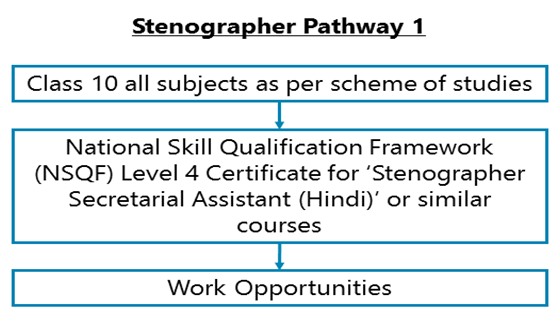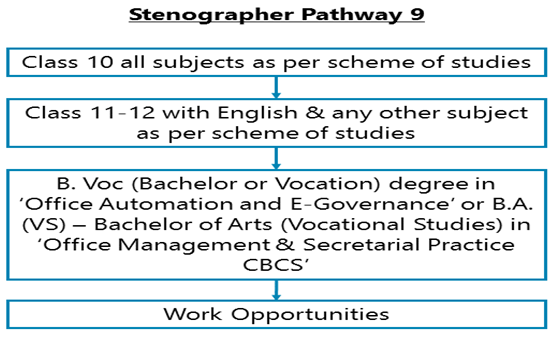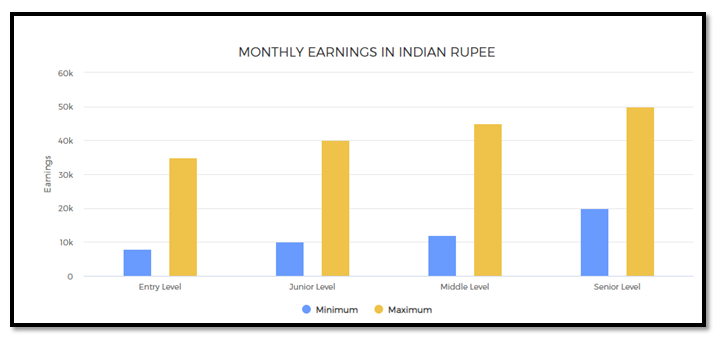Stenographer
Entry Level Qualification
12
Career Fields
Government & Defense Services
For Specially Abled







Career Entrance Exam
About Career
As a Stenographer, you will be responsible for operating computers, stenotype machines/steno writers, writing in shorthand (an abbreviated language) to transcribe exact official, academic, medical, legal or corporate information. The transcription may be while the speaker speaks and you write/type simultaneously (live broadcast captioning) for e.g. in courtrooms, during company presentations or conferences etc. You have to be quick in understanding and capturing the speaker’s words and typing with almost the same speed if it is a live transcription process. There is no room for error in the profession of a Stenographer. Most Stenographers learn to type at 225 words per minute for capturing entire conversations rapidly but precisely. You may be responsible for final press conference briefings.
You need to learn a type of shorthand to catch every word spoken and to take notes on a steno writer. After you feed the notes into the steno machine/computer, they are translated by computer software into English, Hindi or any other regional language. You will also have to check the rough transcript for errors before finalizing it. You need to have good knowledge of official, academic, medical, legal or corporate terminologies. You have high chances of being employed by courts and legal practitioners because lawyers and court officials require an exact transcript for using in courtroom trials.
Key Roles and Responsibilities:
As a Stenographer, you will be engaged with one or more of the following roles and responsibilities: -
1. Drafting business letters, typing reports, correspondence, text or written material from corrected copies, rough drafts, dictation, voice recordings or previous versions, using a computer, steno machine, word processor, typewriter, headsets and transcribing machines.
2. Gathering, registering, and arranging materials to be typed, following instructions.
3. Reviewing and editing dictated material or transcribed reports for grammar, spelling, consistency, clarity, and proper official, academic, medical, legal or corporate terminology.
4. Electronically sorting and compiling text and numerical data, updating, retrieving, and merging documents as needed.
5. Searching for specific sets of typed or stored characters for making changes, collating pages of reports and related documents prepared, adjusting settings for page layout, format, line spacing, or other style requirements.
6. Performing a variety of office and clerical tasks, such as completing insurance claims, handling outgoing and incoming emails, filing, typing, or operating office machines.
7. Using data entry devices, like optical scanners, to feed data into computers for editing or revision.
8. Working with technical material, planning, and typing statistical tables, preparing statistical reports, rearranging or combining material from different sources.
PARTICULARS | DESCRIPTION |
Name | Stenographer |
Purpose | Type Shorthand Methods |
Career Field | Government & Defense Services |
Required Entrance Exam | SSC Steno |
Average Salary | 100000 - 150000 Rs. Per Year |
Companies For You | Government offices, courts, corporate offices & Many More |
Who is Eligible | Class 12th Pass |
Career Entry Pathway
Class 10 all subjects as per scheme of studies- NSQF Level 4 Certificate for ‘Stenographer Secretarial Assistant (Hindi)’ or similar courses
After Class 10, you can go for National Skill Qualification Framework (NSQF) Level 4 Certificate for ‘Stenographer Secretarial Assistant (Hindi)’ or similar courses. The total number of training hours is 2080.
Class 10 all subjects as per scheme of studies- Class 11-12 with any subject combination as per scheme of studies - training at an ITI or similar institute for ‘Stenography’ or related courses
After Class 11-12, you can go for training at any Industrial Training Institute (ITI), National Skill Training Institute (NSTI), Regional Vocational Training Institute (RVTI), National Vocational Training Institute (NVTI), Industrial Training Center (ITC), Workshop Training Institute (WTI) or other vocational institutes for ‘Stenography’, ‘Stenography English’, ‘Stenography Hindi’, ‘Secretarial Practice & Stenography’, ‘Steno (Stenography)’, ‘Stenographer Cum Computer Operator’, ‘Secretarial Practice & Stenography’, ‘Punjabi Stenography’, ‘Secretarial Assistant’, ‘Stenography Tamil’ or related courses. This is a 1-year course. You will sit for All India Trade Test (AITT) to get a National Trade Certificate (NTC) after this course. This exam is held twice a year in the months of February and July. You need to have English as a compulsory subject in school if you want to pursue ‘Stenography English’ or related courses.
Class 10 all subjects as per scheme of studies -Class 11-12 with English & any other subject as per scheme of studies- NSQF Level 4 Certificate for ‘Secretary’ or similar courses
After Class 11-12, you can go for National Skill Qualification Framework (NSQF) Level 4 Certificate for ‘Secretary’ or similar courses. The total number of training hours is 1130. You need to be at least 18 years of age for this course.
Class 10 all subjects as per scheme of studies- Class 11-12 with any subject combination as per scheme of studies - training at an ITI or similar institute for ‘Stenography’ or related courses - obtain National Apprenticeship Certificate
After Class 11-12, you can go for training at any Industrial Training Institute (ITI), National Skill Training Institute (NSTI), Regional Vocational Training Institute (RVTI), National Vocational Training Institute (NVTI), Industrial Training Center (ITC), Workshop Training Institute (WTI) or other vocational institutes for ‘Stenography’, ‘Stenography English’, ‘Stenography Hindi’, ‘Secretarial Practice & Stenography’, ‘Steno (Stenography)’, ‘Stenographer Cum Computer Operator’, ‘Secretarial Practice & Stenography’, ‘Punjabi Stenography’, ‘Secretarial Assistant’, ‘Stenography Tamil’ or related courses. This is a 1-year course. You will sit for All India Trade Test (AITT) to get a National Trade Certificate (NTC) after this course. This exam is held twice a year in the months of February and July. You need to have English as a compulsory subject in school if you want to pursue ‘Stenography English’ or related courses. Then you can obtain National Apprenticeship Certificate (NAC) for ‘Stenographer (English)’, ‘Secretarial Assistant’ or related trades after completing Apprenticeship training. Apprenticeship training will be of 1 year and 6 months.
Class 10 all subjects as per scheme of studies – NSQF Level4 CTS Training in ‘Stenographer Secretarial Assistant (English)’, ‘Stenographer Secretarial Assistant (Hindi)’ or related courses
After Class 10, you can go for Craftsmen Training Scheme (CTS) course for ‘Stenographer Secretarial Assistant (English)’, ‘Stenographer Secretarial Assistant (Hindi)’ or related courses under National Skills Qualification Framework Level 4. This is a 1-year course with 2 semesters of 6 months each.
Class 10 all subjects as per scheme of studies – undergo NIOS course in ‘Stenography (Hindi)’, ‘Stenography (English)’, ‘Stenography (Urdu)’ or related courses
After Class 10, you can enroll for National Institute of Open Schooling (NIOS) Senior Secondary course in ‘Stenography (Hindi)’, ‘Stenography (English)’, ‘Stenography (Urdu)’ or related courses.
Class 10 all subjects as per scheme of studies – Diploma course in ‘Stenography’ or related courses from Polytechnic colleges or similar institutions
After Class 10, you can go for a Diploma course in ‘Stenography’ or related courses from Polytechnic colleges or similar vocational institutions. These are generally 1-2 year courses offered by various establishments across the country.
Class 10 all subjects as per scheme of studies -Class 11-12 with English & any other subject as per scheme of studies- Diploma course in ‘Secretarial Practice’ or related courses from Polytechnic colleges or similar institutions
After Class 11-12, you can go for a Diploma course in ‘Secretarial Practice’ or related courses from Polytechnic colleges or similar vocational institutions. These are generally 1-2 year courses offered by various establishments across the country.
Class 10 all subjects as per scheme of studies -Class 11-12 with English & any other subject as per scheme of studies - B. Voc in ‘Office Automation and E-Governance’ or B.A. (VS)in ‘Office Management & Secretarial Practice CBCS’
After Class 11-12, you can go for a B. Voc (Bachelor or Vocation) degree in ‘Office Automation and E-Governance’ or B.A. (VS) – Bachelor of Arts (Vocational Studies) in ‘Office Management & Secretarial Practice CBCS’.
Required Qualification & Competencies
After class 10, you can go for:
1. NSQF Training courses
2. CTS Training courses
3. NIOS Training courses
4. Diploma courses
Class 11-12
After Class 11-12, you can go for:
1. ITI Training courses.
2. NSQF Training courses.
3. National Apprenticeship Training
4. Diploma courses.
5. B. Voc (Bachelor or Vocation) or B.A. (VS) – Bachelor of Arts (Vocational Studies) courses.
Various private/public vocational training establishments across India offer related courses on:
1. Stenographer (English)
2. Stenographer Secretarial Assistant (English)
3. Stenographer Secretarial Assistant (Hindi)
4. Stenography (Hindi)
5. Stenography (Urdu)
6. Office Management
7. Secretarial Practice
8. Secretarial Assistant
9. Secretarial Practice (English)
10. Secretarial Practice (Vocational)
MINIMUM EDUCATION REQUIRED | MAXIMUM EDUCATION REQUIRED |
Post-Secondary Certificate / Diploma Programs for which the minimum eligibility is a pass in class X. | Under Graduate Undergraduate Degree / Honours Diploma / Graduate Diploma (equivalent to a Degree) Programs for which the minimum eligibility is a pass in Higher Secondary / Class XII School Leaving examination. |
COMPETENCIES REQUIRED
1. You should have interests for Conventional Occupations. Conventional occupations involve repetitive and routine tasks as well as fixed processes or procedures for getting things done. These occupations involve working more with data, systems, and procedures and less with ideas or creativity.
2. You should have interests for Realistic Occupations. Realistic occupations involve more practical and hands-on activities than paperwork or office work. Realistic occupations often involve physical activities for getting things done using various tools and equipment.
3. You should have knowledge of Computers - computer hardware and software, computer programming, computer networks, computer, and mobile applications.
4. You should have knowledge of Clerical and secretarial activities - Knowledge of various clerical tasks and procedures such as handling emails and phone calls, filling up forms, data entry, managing files, managing records, maintaining information databases, stenography, scheduling appointments, and other office procedures and general administrative tasks.
5. You should have Active Learning Skills - Focused and continuous learning from various sources of information, observation and otherwise for application in getting work done.
6. You should have Auditory Attention Ability - The ability to focus on a single source of sound in the presence of other distracting sounds.
7. You should have Perceptual Speed - The ability to quickly and accurately compare similarities and differences among sets of letters, numbers, objects, pictures, or patterns. The things to be compared may be presented at the same time or one after the other. This ability also includes comparing a presented object with a remembered object.
8. You should have Finger Dexterity - The ability to make precisely coordinated movements of the fingers of one or both hands to grasp, manipulate, or assemble very small objects.
9. You should have Information Ordering Ability - The ability to arrange things or actions in a certain order or pattern according to a specific rule or set of rules (e.g., patterns of numbers, letters, words, pictures, mathematical operations).
10. You are always or mostly careful about your actions and behavior.
11. You are practical always or in most situations.
12. You are always or mostly disciplined in your action and behavior.
13. You are always or mostly organized in your day-to-day life and activities.
Career - Job Opportunities & Profiles
You will get job opportunities like the following:
1. Stenographer,
2. Secretary / Back Office Support,
3. Secretarial Assistant,
4. Office Automation – Executive,
5. Typist,
6. DTP (Desk-Top Publishing) Operator,
7. Private / Personal Secretary,
8. Backend Process - Typist
Many types of organizations like these will need your skills:
1. Offices of District Judges, Sessions Judges or other courtrooms
2. Offices of Ministers and Ministerial departments
3. Law firms
Backend departments of various consultancies, private/public sector companies
1. Legal Consulting companies
2. Strategic Research companies
3. Publishing sector companies
4. Academic Institutions and Universities, libraries etc.
5. Companies dealing with medical correspondence
CAREER GROWTH
From entry-level job positions as a Stenographer, Secretary / Back Office Support, Secretarial Assistant, Office Automation – Executive, Typist, DTP (Desk-Top Publishing) Operator, Private / Personal Secretary, Backend Process - Typist, you may rise up to roles like Senior Stenographer, Senior Typist, Office Automation – Senior Executive, Chief Typist - Legal etc.
Salary Offered
1. Salaries vary according to job profiles and the kind of facilities you get to work at.
2. In the entry-level jobs: You may get about Rs. 8,000 – Rs. 10,000 or more per month.
3. Salaries increase with your work experience and as you get promoted.
4. After having 1-6 years of experience, you may expect about Rs. 10,000 – Rs. 15, 000 per month or more.
5. After having 6-12 years of experience, you may get about Rs. 12,000 – Rs. 35,000 or more per month.
6. In the senior level jobs, with 12-20 years of work experience, you may expect to get about Rs. 20,000 – Rs. 40, 000 or more per month.
7. Under the 7th pay commission, Stenographers employed with the Central Government fall under Grade C or D. Grade C falls under pay band 1 and Grade D falls under pay band 2. The range of entry-level salaries for Grade C (PB 1) is Rs. 9300 – Rs. 34800 per month excluding allowances (grade pay of Rs. 4600). The range of entry-level salaries for Grade D (PB 2) is Rs. 5200 – Rs. 20200 per month excluding allowances (grade pay of Rs. 2400). Grade D is further divided into Grade X (posted in Delhi) and Grade Y (posted anywhere in India). However, salary may also differ according to your job profile or location. If you are not provided accommodation, you will be given House Rent Allowance (HRA) and Dearness Allowance (DA) is common for all employees.
MONTHLY EARNINGS IN INDIAN RUPEE
1. Entry level: 0 - 2 years of work experience
2. Junior Level: From 1 to 12 years of work experience
3. Mid-Level: From 5 to 20+ years of work experience
4. Senior Level: From 10 to 25+ years of work experience (there could be exceptions in some high-end technical, financial, engineering, creative, management, sports, and other careers; also in the near future, people will reach these levels much faster in many careers and in some careers, these levels will have no meaning as those careers will be completely tech skill driven such as even now, there is almost no level in a Cyber Security Expert’s job)
Work Activities
1. Processing information– Transcribing, entering, storing, recording or maintaining information in electronic, magnetic or written form; searching, compiling, tabulating, calculating, auditing, verifying or otherwise dealing with information processing including data entry, transcription, recording, storing and maintaining databases.
2. Using computers for work– Using computers for day-to-day office work; using computer software for various applications in day-to-day professional work; entering data and process information; for writing.
3. Getting Information and learning– Observing, hearing, reading, using computers, or otherwise obtaining information and learning from it.
4. Organising, planning and prioritising tasks - Planning and organising tasks in order to achieve work goals; prioritising tasks to achieve goals and making the best use of the time available.
5. Developing and maintaining inter-personal relationships- Developing professional relationships with co-workers and others outside organizations and maintaining good relationships.
6. Communicating with co-workers and others- Communicating with people in writing, verbally or otherwise inside your workplace and various other people who have professional relationships with your place of work including vendors, government officials, etc. or with people at large.
Future Prospects
The future for this pathway is not as bright since these jobs are expected to go redundant in the next 10-20 years’ time. With the advent of Artificial Intelligence, Automation and Talent Analytics, the human resource teams and hiring managers are employing hybrid hiring models. Also, with gig economy and flexible hiring structures making inroads into the labor market, more temporary and contract based jobs are on the rise. However, in the public sector phase, there may still be a number of existing human gaps. In the present scenario, skills are changing rapidly and plain vanilla skills are being replaced with more specializations too. Hence, skilling, upskilling and reskilling are in great demand now especially. This is also creating a resume black hole in the organized labor market gradually.
FUTURE PROSPECTS AT A GLANCE
















